Dear Zazie, Here is today’s Lovers’ Chronicle from Mac Tag to his muse. What currency are you on? Rhett
The Lovers’ Chronicle
Dear Muse,
© copyright 2020 mac tag/cowboy coleridge all rights reserved
© copyright 2019 mac tag/cowboy coleridge all rights reserved
just one long dénouement
the dyin’ embers, the untyin’
of the knot, of the mess
strewn in the rear view
all i can tell
is that this is
authentic
i hear, and follow
the inner voice
the vulnerability
is real y’all
did forever
turn out to be
too long
© copyright 2018 mac tag/cowboy coleridge
a home should have
proper balance,
n’est-ce pas
mine has
four bedrooms
one bed
three outdoor spaces
a library
and four writin’ rooms,
one outside
that is what i call
balance…
at least it can be said,
an attempt was made
to follow the path
of the Great American Dream
however ill that try
turned out to be
but better damn near
did not happen than
never did, i s’pose
and sadness has fled
for what could be called
acceptable sorrow
beside the dyin’ embers,
livin’ this dream
writin’ this for you
is far more than ever
i could have hoped for
© copyright 2017 mac tag/cowboy coleridge all rights reserved
This started out as a poem called A Reverie in Paris, inspired from watchin’ An American in Paris with Gene Kelly, again, but then the muses took over and this is what they wrote; the Poem of the Day:
Currency
I dream you are still here
The only possible way
To salve the wound
What currency is this
What must I pay
To hold on to this…
We wake in our flat
Coffee on the balcony
We make love again
What currency
Keeps this goin’
Makes me want to stay
We walk to a small cafe
It is sunny and warm
We sit outside and have our fill
Of food and café au lait
Writin’ in my journal
Of things we talk about and see
The way the sun shines in your hair
The way your hand feels in mine
The way I feel when you laugh
The way I see myself in your eyes
What currency keeps this goin’
How to make sure this never ends
© copyright 2012 mac tag/Cowboy Coleridge all rights reserved
The Song of the Day is “Strange Currencies” by R.E.M. we do not own the rights to this song. no copyright infringement intended.
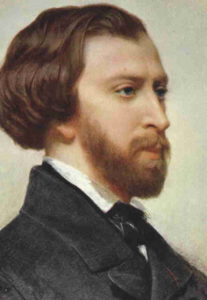 Today is the birthday of Alfred de Musset (Alfred Louis Charles de Musset-Pathay, Paris 11 December 1810 – 2 May 1857 Paris); dramatist, poet, and novelist. Along with his poetry, he is known for writing the autobiographical novel La Confession d’un enfant du siècle (The Confession of a Child of the Century).
Today is the birthday of Alfred de Musset (Alfred Louis Charles de Musset-Pathay, Paris 11 December 1810 – 2 May 1857 Paris); dramatist, poet, and novelist. Along with his poetry, he is known for writing the autobiographical novel La Confession d’un enfant du siècle (The Confession of a Child of the Century).
The tale of his celebrated love affair with George Sand in 1833–1835 is told from his point of view in his autobiographical novel La Confession d’un Enfant du Siècle (The Confession of a Child of the Century) (1836), which was made into a 1999 film, Children of the Century, and a 2012 film, Confession of a Child of the Century, and is told from her point of view in her Elle et lui (1859). Musset’s Nuits (Nights) (1835–1837) traces the emotional upheaval of his love for Sand from early despair to final resignation. He is also believed to be the anonymous author of Gamiani, or Two Nights of Excess (1833), a lesbian erotic novel also believed to be modeled on Sand.
Director Jean Renoir’s La règle du jeu (The Rules of the Game) was inspired by Musset’s play Les Caprices de Marianne.
Henri Gervex’s 1878 painting Rolla was based on a poem by De Musset. It was rejected by the jury of the Salon de Paris for immorality, since it features suggestive metaphors in a scene from the poem, with a naked prostitute after having sex with her client, but the controversy helped Gervex’s career.
Numerous (often French) composers wrote works using Musset’s poetry during the 19th and early 20th century:
Georges Bizet’s opera Djamileh (1871, with a libretto by Louis Gallet) is based on Musset’s story Namouna. Bizet also set Musset’s poem “A Une Fleur” for voice and piano.
Ruggero Leoncavallo’s symphonic poem “La Nuit de Mai” (1886) was based on Musset’s poetry.
The play La Coupe et les lèvres was the basis of Giacomo Puccini’s opera Edgar (1889).
Dame Ethel Smyth composed an opera based on Fantasio that premiered in Weimar in 1898.
The Welsh composer Morfydd Llwyn Owen wrote song settings for Musset’s La Tristesse and Chanson de Fortunio.
Mario Castelnuovo-Tedesco’s Cielo di settembre, op. 1 for solo piano (1910) takes its name from a line of Musset’s poem “A quoi rêvent les jeunes filles”. The score, in the original publication, is preceded by that line, “Mais vois donc quel beau ciel de septembre…”
Lili Boulanger’s Pour les funérailles d’un soldat for baritone, mixed chorus and orchestra is a setting of several lines from Act IV of Musset’s play La Coupe et les lèvres.
Rebecca Clarke’s Viola Sonata (1919) is prefaced by two lines from Musset’s La Nuit de Mai.
The opera Andrea del Sarto (1968) by French composer Jean-Yves Daniel-Lesur (1908–2002) was based on Musset’s play André del Sarto.
Lorenzaccio, which takes place in Medici’s Florence, was set to music by the musician Sylvano Bussotti in 1972.
Shane Briant plays Alfred de Musset in a Masterpiece Theatre production of “Notorious Woman” in 1974.
In 2007, Céline Dion recorded a song called “Lettre de George Sand à Alfred de Musset” for her album D’elles.
Je ne puis;—malgré moi l’infini me tourmente.
- I can’t help it, the idea of the infinite torments me.
- L’Espoir en Dieu, Revue des deux Mondes (1838).
On ne badine pas avec l’amour, 1834
-
On ne badine pas avec l’amour
La Nuit de Mai, 1835
La Muse : Les plus désespérés sont les chants les plus beaux,
Et j’en sais d’immortels qui sont de purs sanglots.
-
Poésies Nouvelles
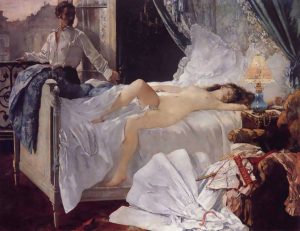
Henri Gervex’s 1878 painting Rolla was based on a poem by De Musset
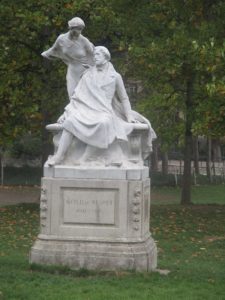
Statue d’Alfred de Musset et de sa muse au parc Monceau.
Today is the birthday of Mark George Tobey (Mark George Tobey; Centerville, Wisconsin; December 11, 1890 – April 24, 1976 Basel, Switzerland);painter. His densely structured compositions, inspired by Asian calligraphy, resemble Abstract expressionism, although the motives for his compositions differ philosophically from most Abstract Expressionist painters. His work was widely recognized throughout the United States and Europe. Along with Guy Anderson, Kenneth Callahan, Morris Graves, and William Cumming, Tobey was a founder of the Northwest School. Senior in age and experience, he had a strong influence on the others; friend and mentor, Tobey shared their interest in philosophy and Eastern religions. Similar to others of the Northwest School, Tobey was mostly self-taught after early studies at the Art Institute of Chicago. In 1921, Tobey founded the art department at The Cornish School in Seattle, Washington.
Gallery
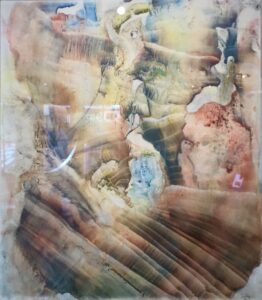
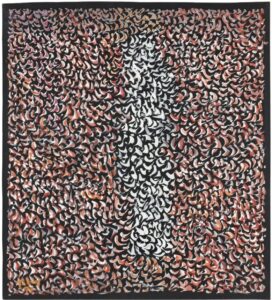
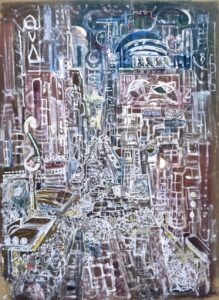
 And today is the birthday of James “Jim” Harrison (Grayling, Michigan; December 11, 1937 – March 26, 2016); writer known for his poetry, fiction, reviews, essays about the outdoors, and writings about food. Perhaps best known for his 1979 novella Legends of the Fall. He has been called “a force of nature”, and his work has been compared to that of William Faulkner and Ernest Hemingway. Harrison’s characters tend to be rural by birth and to have retained some qualities of their agrarian pioneer heritage.
And today is the birthday of James “Jim” Harrison (Grayling, Michigan; December 11, 1937 – March 26, 2016); writer known for his poetry, fiction, reviews, essays about the outdoors, and writings about food. Perhaps best known for his 1979 novella Legends of the Fall. He has been called “a force of nature”, and his work has been compared to that of William Faulkner and Ernest Hemingway. Harrison’s characters tend to be rural by birth and to have retained some qualities of their agrarian pioneer heritage.
Legends of the Fall (1994) was made into a film directed by Edward Zwick and starring Brad Pitt, Anthony Hopkins, Aidan Quinn, Julia Ormond and Henry Thomas. The story is about three brothers and their father living in the wilderness and plains of Montana in the early 20th century and how their lives are affected by nature, history, war and love. The film’s time frame spans from World War I through the Prohibition era, ending with a brief scene set in 1963. The film was nominated for three Academy Awards and won for Best Cinematography (John Toll). Both the film and book contain occasional Cornish language terms, the Ludlows being a Cornish emigrant family. Quotes from the movie…
One Stab
- It’s hard to tell of happiness, time goes by and we feel safe too soon.
- Some people hear their own inner voices with great clearness. And they live by what they hear. Such people become crazy… or they become legends.
Susanna
- Forever turned out to be too long Tristan.
Tristan
- We all love Samuel. Samuel is dead. WHAT!?
- Because you love her I will forgive you for that, once. ONCE! But you say that again and we are not brothers.
- You know when Samuel died I cursed God. Have I damned everyone around me as well as myself?
Alfred
- Stab speak English?! Ha! He wouldn’t lower himself to speak English would you Stab?!
- I followed all of the rules, man’s and God’s. And you, you followed none of them. And they all loved you more. Samuel, Father, and my… even my own wife.
mac tag
…Love fled
And paced upon the mountains overhead,
And hid his face amid a crowd of stars.
– W. B. Yeats

No Comments on "The Lovers’ Chronicle 11 December – embers – birth of Alfred de Musset & Jim Harrison – art by Mark Tobey"